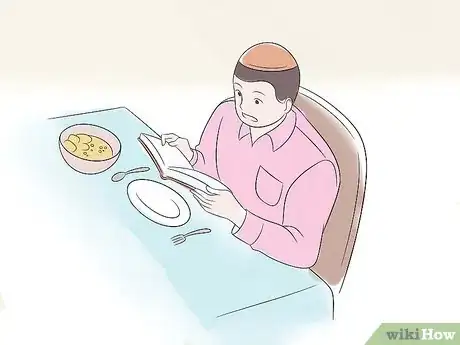wikiHow is a “wiki,” similar to Wikipedia, which means that many of our articles are co-written by multiple authors. To create this article, 24 people, some anonymous, worked to edit and improve it over time.
wikiHow marks an article as reader-approved once it receives enough positive feedback. In this case, 88% of readers who voted found the article helpful, earning it our reader-approved status.
This article has been viewed 374,990 times.
Learn more...
Saying a simple prayer before a meal can be an excellent way to center yourself and appreciate your blessings, whether you're alone or in a large group. Saying grace doesn't need to be an elaborate recitation. You can learn personal devotions and formal prayers for a variety of different cultures, religions, and beliefs. See Step 1 for more information.
Steps
Offering Personal Thanks
-
1Say a simple thanks for the meal to the people present. If you're called upon to say grace at a family gathering or holiday meal, it can be an intimidating experience. But like a toast at a wedding or any public speech, there's no one "right" way to offer thanks, though there are several common denominational prayers for different faiths, discussed in the following method. The most important thing to remember in the moment is to speak from the heart, as sincerely and honestly as possible, and offer appreciation and thanks to whatever higher power you choose.[1]
- Example: Bless this food and the people who prepared it. Many thanks for the meal and the company.
-
2Consider the occasion. If you're saying grace for a holiday meal, a family gathering, or an informal dinner, you can temper your prayer to the occasion. Even saying thanks for the changing of seasons can be an appropriate call for grace.
- Example: I'm blessed to be able to spend the holidays here with all of you. Let us appreciate this meal in fellowship and celebration.
- Example: It's such a blessing to be able to come together and celebrate the life of Aunt Jan in this wonderful group of people. Many thanks for the meal and the fellowship.
- Example: It's such a pleasure to spend a warm summer evening on the porch with all of you and this wonderful food. Let's all offer thanks for the bounty we've received.
Advertisement -
3Use a quick personal anecdote. Depending on the group and the occasion, it can be appropriate to offer a brief moment of story to act as a blessing. When spend with close family or close friends, on a birthday or other personal holiday, this is a nice touch. It's also common to offer a quick personal blessing for each person present, if in a small group.
- Example: I've always looked up to Aunt Jan as a personal inspiration and hero for her kind dedication to service and cheerful outlook on life. I'll always cherish the hours we spent together in her garden. I count myself blessed to have someone in my life as inspiring as her, and to be able to gather here today and celebrate her life with you all.
- Example: What a blessing to come together today for this wonderful meal at the end of the week. Our thoughts are with Jason as his completes another tough week of school, and with Karen during the first days of a new job, and with all our family who can't be here tonight. May they be blessed and filled with happiness.
-
4Keep it brief. Saying grace is a time for everyone at the table to take hands or sit quietly in contemplation, reflecting on their blessings and privileges before taking a meal. It should neither be a sermon nor a joke. A simple and quick blessing is best, regardless of the devotion and the hunger of the people present. Don't rush through it, but keep it to a few brief sincere sentences, and end it with "amen" or the closing of your choice. A call to grace might look something like this:
- All present take hands, or bow their heads quietly.
- A quick moment or two of silence before beginning, enough for a centering breath.
- The blessing or prayer, a few sentences at most.
- The closing. "Amen," a Hebrew word meaning "It is so" is a common closing for Christian and personal or secular prayers alike.
Reciting a Formal Prayer
-
1Address and thank God for the food and fellowship at a Christian table. To say grace in a Christian setting, there are several short common prayers frequently used, though no one is universal or more appropriate than another. In general, European and Catholic denominations will address meal-time prayers to God or "The Lord," while Evangelical Christians and other denominations that emphasize a personal relationship with Christ will address prayers to Jesus. There's no hard or fast rule about this, though, so speak from the heart.
- Example: Bless this food to our bodies, Lord, and let us hold you in our hearts. In Jesus name we pray, Amen.
- Example: Bless us, oh Lord, and these your gifts which we are about to receive from your bounty. Through Christ our Lord we pray, Amen.
-
2Pray before and after the meal at a Muslim table. For practitioners of Islam, it's common practice to recite a brief prayer of grace before the meal and after the meal. It's especially important to be quiet and do nothing else during the prayer but address Allah.
- Before the meal: Bismillahi wa 'ala baraka-tillah. (In Allah's name and upon the blessings granted by Allah, we eat.)
- After the meal: Alham do lillah hilla-thee At Amana wa saquana waja 'alana minal Muslimeen. (All praise to Allah who gave us food and drink and who made us Muslims.)
-
3Perform birkat hamazon after a meal at a Jewish table. There are many separate blessings for particular items of food such a fish, meat, and vegetables, though a Jewish meal is said to be incomplete if it does not include bread. Birkat hamazon, or the "Grace after Meals," is typically recited to one's self after a meal including bread or matzoh is finished, and is printed in most Hebrew prayer books, to be sung aloud at formal gatherings. It's common to recite in either full or annotated form, if pressed for time. In a formal setting, the leader will start the prayer and the group will respond.[2] It's a semi-complicated text, made up of four distinct blessings:
- The meal: Baruch Eloheinu she-achalnu mishelo uv'tuvo chayinu. Baruch hu uvaruch sh'mo. (Praised be our God, of whose abundance we have eaten, and by whose goodness we live. Praised be the Eternal God.)
- The land: Kakatuv, v'achalta v'savata, uveirachta et Adonai Elohecha al haaretz hatovah asher natan lach. Baruch atah Adonai, al haaretz v'al hamazon. (As it is written: When you have eaten and are satisfied, give praise to your God who has given you this good earth. We praise You, O God, for the earth and for its sustenance.)
- Jerusalem: Uv'neih Y'rushalayim ir hakodesh bimheirah v'yameinu. Baruch atah Adonai, boneh v'rachamav Y'rushalayim. Amen. (Let Jerusalem, the holy city, be renewed in our time. We praise You, Adonai, in compassion You rebuild Jerusalem. Amen.)
- God: HaRachaman, hu yimloch aleinu l'olam va-ed. HaRachaman, hu yitbarach bashamayim uvaaretz. HaRachaman, hu yishlach b'rachah m'rubah babayit hazeh, v'al shulchan zeh she-achalnu alav. HaRachaman, hu yishlach lanu et Eliyahu HaNavi, zachur latov, vivaser lanu b'sorot tovot, y'shuot v'nechamot. (Merciful One, be our God forever. Merciful One, heaven and earth alike are blessed by Your presence. Merciful One, bless this house, this table at which we have eaten. Merciful One, send us tidings of Elijah, glimpses of good to come, redemption and consolation.)
-
4Recite a personal mantra, a verse from the Vedas, or from the Mahabharata to sanctify a Hindu meal. Hindu traditions are largely regional and vary widely, and it would be impossible to distill into a single traditional prayer for mealtime. Personal mantras are common before-meal prayers, as well as recitations from the Bhagavad Gita (specifically the 4th chapter). A typical example might look something like this:
- Brahmārpaṇam brahma havir (Brahman is the oblation)
- Brahmāgnau brahmanāhutam (Brahman is what constitutes the offerings)
- Brahmaiva tena gantavyam (by Brahman is the oblation poured into the fire of Brahman)
- Brahma karma samādhinā. (Brahman verily shall be reached by him who always sees Brahman in all actions.)
-
5Hold hands in silence. At many different tables, including Buddhist, Quaker, and secular humanist traditions, a brief period of silence before meals is used to center the self, quiet the mind, and let in the light. To pray quietly both as a group and as individuals, take hands and bow your heads in silence, and still your thoughts. After a few moments, squeeze hands as a group to signal the end of the prayer, and commence the meal.
Blessing in Other Ways
-
1Go with a cafeteria prayer. Depending on the occasion, a more information or humorous prayer might be just as appropriate as a solemn one. If you're sitting down informally but still want to throw up a thanks, go with a classic rhyming prayer of school cafeterias and summer camps:
- Example: Good food, good meat, good God, let's eat.
- Example: Lord, we know without a doubt, you'll bless this food as we pig out.
- Example: Bless this food before us set, which needs all the help that it can get.
-
2Offer a drunkard's toast. If you've just seated yourself at a table with a crew that likes to imbibe, celebrate the spirits with this classic:
- Example: May your glass be ever full, may the roof over your head be always strong, and may you be in heaven half an hour before the devil knows you're dead.
- Example: When I dream of Heaven, I dream of the past / Surrounded by good friends raising a glass.
-
3Quote Emerson. Eating at an English professor's house? Say grace by quoting everyone's favorite Transcendentalist. His poem "Grace" reads:
- For each new morning with its light, / For rest and shelter of the night, / For health and food, for love and friends, / For everything Thy goodness sends, / We offer thanks. Amen.
-
4Learn the American Sign Language (ASL) blessing. Thanks and meals are directly linked in ASL, whose sign for "thanks" involves moving the hand from the mouth forward, displaying a flat palm. This is traditionally used before a meal in place of a blessing, and as an invitation of both thanks and eating.[3]
-
5Use aphorisms from around the world. Learning simple blessings from cultures not your own can be an interesting way of offering perspective and gravity to the meal. Some examples:
- Japanese: itadakimasu (I am receiving)
- Latin American: To those who have hunger, give bread. To those who have bread, give hunger for justice.
- Ghanaian: Earth, when I am about to die I will lean on you. While I am alive, I will depend on you.
- Southeast Asia: This food is the gift of the whole universe. May we be worthy to receive it. May the energy in this food give us the strength to transform our unwholesome qualities into wholesome qualities.
Community Q&A
-
QuestionDoes food come before grace?
 Community AnswerNo, people who say grace do so before the meal.
Community AnswerNo, people who say grace do so before the meal. -
QuestionDoes one say grace before eating a snack, or is it just for meal time?
 Community AnswerSaying grace is just a thankful prayer for food, which you say before eating. You can say grace before eating a snack if you like, but you don't have to. Meal time is more formal.
Community AnswerSaying grace is just a thankful prayer for food, which you say before eating. You can say grace before eating a snack if you like, but you don't have to. Meal time is more formal. -
QuestionDo I sing or say a grace?
 Community AnswerYou can sing if you like, but people usually say grace. Saying grace is like praying, mainly for food.
Community AnswerYou can sing if you like, but people usually say grace. Saying grace is like praying, mainly for food.
References
About This Article
To say grace at a family meal, you can simply say thanks for the meal and to those who prepared it. Alternatively, if you’re saying grace for a holiday meal, try to match your prayer to the occasion, like “I’m blessed to spend the holidays here with you all. Let us appreciate this meal in fellowship.” No matter what you decide to say, try to keep it brief and from the heart. Finally, you may want to close with “Amen,” which is common for Christian and secular prayers and a perfect way to signal to others that you’re done. To learn how to recite a formal prayer for a Muslim, Jewish, or Hindu table, keep reading!










































































